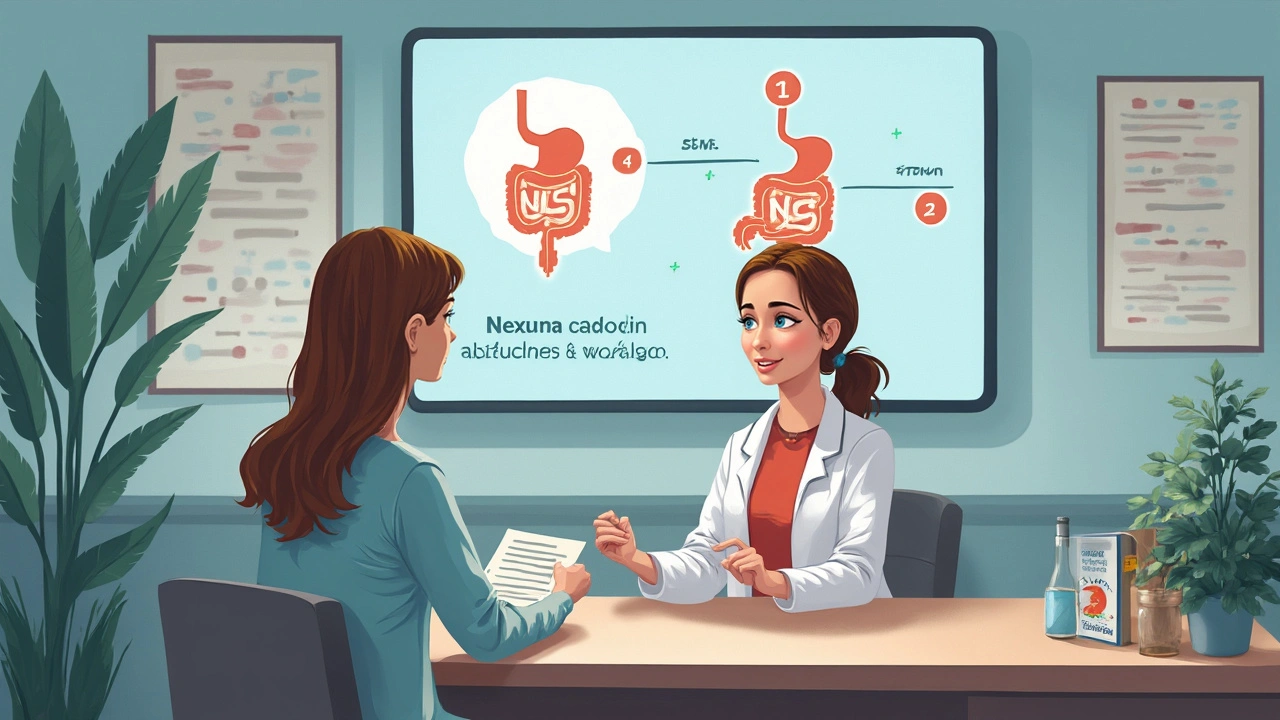You might be surprised to know that Nexium—or esomeprazole—was once hailed as the 'purple pill' miracle fix for any kind of burning, gnawing, miserable heartburn. These little pastel capsules have seen the inside of more medicine cabinets than some fever pills. But what exactly is going on inside your body when you take Nexium? Why do so many doctors reach for it the moment you say 'acid reflux'? And is it really as harmless as it seems, or is there more to the story?
How Nexium Works and Why Doctors Prescribe It
This tiny pill packs a punch. Nexium is a type of drug called a proton pump inhibitor (PPI), which is really just a fancy way of saying it turns off your stomach’s acid fireworks at the source. Normally, your stomach pumps out acid to help break down food, but sometimes it gets carried away. When it does, the acid can splash up into your food pipe, causing burning, pain, or even damage to the lining. That’s acid reflux, or GERD if it keeps coming back. Nexium tells the acid-producing pumps in your stomach to chill out for a while, lowering the acidity level inside.
Doctors love Nexium because it works for a wide range of stomach woes. It’s prescribed for classic heartburn, sure. But it’s also used to help heal stomach ulcers, prevent ulcers caused by NSAIDs like ibuprofen, treat Zollinger-Ellison syndrome (a rare thing where your body makes way too much acid), and keep things smooth in people taking daily pain medicines that can be tough on the belly. You might get Nexium after an endoscopy if there’s evidence of acid damage or inflammation, or when other meds have failed to calm things down.
One cool fact: Nexium is actually just one version of a drug called omeprazole, but tweaked a little so the body can absorb it more consistently. Funny enough, it was released right when omeprazole (Prilosec) was about to go generic, and the pharmaceutical company needed a new flagship. Nexium took over overnight. The recommended dose for reflux is typically 20 to 40 mg daily, always on an empty stomach, usually about 30 to 60 minutes before you eat. Timing matters, otherwise the medicine won’t work its magic.
If you’re wondering how quickly you’ll feel relief, Nexium is not an instant fix. Unlike antacids that zap heartburn on the spot, Nexium takes a couple of days to really calm things down since it works on a deeper level. For some folks, the big changes show up after a week of steady use. Stick with it, and most find their symptoms fade out or disappear entirely, giving their esophagus a break from the acid bath.
Now, if you’re picking up Nexium over the counter, you’ll see it labeled as Nexium 24HR. The FDA approved this for short-term relief—think two weeks or less. But doctors may prescribe it for longer if your stomach troubles need more time to heal.

Side Effects, Risks, and Surprising Facts About Nexium
You probably don’t think much about side effects when you’re desperate to stop the fire in your chest, but Nexium isn’t all sunshine. Most people tolerate it really well, especially in the short term. But if you read the official pamphlet, there’s a laundry list of stuff that might make you rethink lifelong use. Mild side effects include headaches, belly pain, nausea, and dry mouth. Sometimes you get diarrhea or even the opposite—constipation. For most people, these are just blips that pass, but if something feels off, talk to your doctor. Don’t push through just because you want the heartburn gone.
Here’s where things get interesting: the longer you take PPIs like Nexium, the more complicated it can get. Researchers have spotted links between long-term use and some things that sound scary—bone thinning, higher risk of fractures, low magnesium, vitamin B12 deficiency, gut infections like C. diff, and possible kidney problems. There’s even talk about increased risks for things like certain digestive cancers when people take high doses for years at a stretch, although the data isn’t rock solid. In 2024, the FDA even pushed for tougher warnings on Nexium and its cousins for chronic kidney disease and stomach infections.
So, what counts as 'long term'? Most doctors start raising an eyebrow if you’re still popping Nexium after three months. The goal is always to use the lowest effective dose for the shortest time you need. Some people really do need it long term—like those with Barrett’s esophagus, where the risk of cancer is higher if acid isn’t kept in check. But there are ways to cut the risk. Ask your doctor regularly: “Do I still need to take this, or is it safe to step down—maybe using it every other day, or switching back to something lighter like antacids?”
Quite a few folks find they hit a stopping point and rebound—when you try to quit Nexium, the stomach suddenly makes too much acid, making symptoms worse. If that happens, don’t panic. Tapering slowly instead of a hard stop, or using antacids during the switch, can help the body adjust. Dietary tweaks go a long way too—avoiding spicy food, big late-night meals, alcohol, and smoking helps your stomach behave even if you’re easing off the pills.
A little-known fact: Nexium can mess with other drugs. For example, it makes it harder to absorb certain antifungals, B12, and even HIV meds. If you’re on blood thinners like clopidogrel, combining them can tweak how your body responds. So, always let your doctor know every pill or supplement you’re taking, even if it’s just a vitamin. Don’t rely on pharmacists or the internet to catch every interaction.
Some people also wonder if it’s OK to take Nexium during pregnancy. The research looks pretty reassuring—most studies show little to no risk for major problems, but you always want to double-check with your OB or doctor just to be safe. For breastfeeding, a small amount of the drug might show up in milk, but there haven’t been reports of bad effects. Still, always talk to your healthcare team if you’re pregnant, breastfeeding, or planning either while on Nexium.

Tips, Tricks, and Healthy Alternatives for Managing Acid Reflux
If you’re relying on Nexium every morning just to get through breakfast, it might be time to tweak the big picture—not just the pills. Try a few simple tricks that could shut down acid reflux fast without needing higher doses or stronger meds.
- Eat smaller meals spaced throughout the day instead of big, heavy dinners.
- Tip your headboard up a few inches instead of lying flat. Gravity can help keep acid where it belongs—down in your stomach, not up in your throat.
- Avoid eating at least two hours before lying down. That late-night snack? Save it for breakfast instead.
- Cut back on trigger foods: think spicy curries, tomato sauce, coffee, chocolate, and citrus. Everyone’s different, but these are common culprits.
- If you smoke, consider quitting. Tobacco relaxes the muscle that keeps acid in your stomach.
- Lose a few pounds if you’re carrying extra weight around your middle—it puts more pressure on your stomach and pushes acid up.
Many people ask if there are alternatives to Nexium. There are! H2 blockers like famotidine (Pepcid) or ranitidine (although it was largely pulled for safety reasons) used to be the next choice. They don’t block as much acid as a proton pump inhibitor (like Nexium), but they work faster and have fewer risks with long-term use. Antacids like Tums or Gaviscon can neutralize acid instantly, great for quick relief. But they don’t fix the deeper problem if you need long-term support.
Natural remedies are always popular—ginger tea, chamomile, or even chewing gum can help neutralize acid and soothe the lining of your esophagus. Just be careful: not all herbal cures are proven, and a few could mess with meds or cause allergies. Don’t try anything new until you double-check with your doctor.
Something a lot of people forget: stress matters. When you’re anxious or tense, your body makes more acid and your stomach empties slower. Learning to manage stress—meditation, regular walks, or even a few deep breaths before eating—can make a bigger difference than you’d think. Don’t underestimate the power of good habits alongside medicine.
Finally, if you’ve tried pills, dietary tweaks, and every trick in the book but reflux keeps coming back, see your doctor. Sometimes reflux is hiding something more serious that needs testing or stronger treatment. Nexium—and all these acid-reducing medicines—mask symptoms well, but they don’t fix problems like severe esophagitis, strictures, or early cancer. At the end of the day, regular check-ups can catch these before they cause real harm.


arthur ball
May 30, 2025 AT 08:07Man, I was on Nexium for like 18 months straight after my wedding reception turned into a firestorm of heartburn. Thought I was fixed forever. Then one day I just stopped cold turkey and nearly cried from the rebound. Ended up tapering with Tums and sleeping propped up like a vampire in a gothic novel. Best decision ever. My stomach actually thanked me.
Harrison Dearing
May 31, 2025 AT 12:08LOL so you’re telling me this purple pill is just a fancy placebo with a side of kidney damage? 😂 I’ve been on it for 3 years and my doctor still acts like I’m a saint for taking it. Meanwhile my bones feel like crushed eggshells. Wake up people.
Justice Ward
June 2, 2025 AT 03:21I used to think Nexium was my knight in shining armor-until I realized I was the one holding the sword to my own gut. The truth? It’s not the acid that’s the villain, it’s the lifestyle that lets it run wild. I swapped late-night tacos for chamomile tea and a 7pm dinner cutoff. No pills. No drama. Just peace. And yeah, my digestion now has a personality. A chill one.
bhuvanesh kankani
June 3, 2025 AT 01:40While I appreciate the detailed overview, I must emphasize that traditional Ayurvedic practices offer gentle yet effective alternatives for acid reflux-such as licorice root decoctions, fennel seed chewing, and avoiding cold drinks after meals. These methods have been used for millennia and often restore balance without suppressing natural gastric function. Always consult a qualified practitioner before making changes to long-term medication.
maria norman
June 3, 2025 AT 14:23So we’ve got a multi-billion dollar industry built on convincing people their stomach is a malfunctioning volcano… when really, it’s just mad they keep feeding it nachos at midnight. Genius. I mean, if you can’t fix the behavior, just sell the band-aid. Again. With a purple pill. And a warning label the size of a novel.
Iris Schaper
June 3, 2025 AT 20:05wait so you can just like… stop taking nexium and your stomach goes nuts? i did that once and thought i was dying. turns out i just needed to chill and not eat pizza at 2am. also i think my doctor just likes prescribing it because it’s easy. not because it’s smart.
katerine rose
June 4, 2025 AT 20:00Selma Cey
June 5, 2025 AT 23:30What if the real problem isn’t acid… but the fact that we’ve been conditioned to fear it? What if stomach acid is supposed to be strong? What if we’re the ones who’ve become too fragile? What if the pill isn’t healing you… it’s making you dependent on being broken?